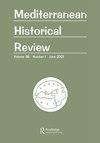Mapping ancient gods: naming and embodiment beyond “anthropomorphism”. A survey of the field in echo to the books of M.S. Smith and R. Parker
IF 0.2
2区 历史学
Q1 HISTORY
引用次数: 5
Abstract
Two recent books provide exceptionally stimulating insights on how space gives shape to religious representations. On the one hand, Mark S. Smith’s 2016 book Where the Gods Are: Spatial Dimensions of Anthropomorphism in the Biblical World focuses on the spatial dimension of the divine presence, as a crucial dimension of human experience. On the other hand, Robert Parker’s 2017 book Greek Gods Abroad: Names, Natures and Transformations, concentrates on the naming processes and their evolution in cross-cultural contexts. Both publications offer rich evidence on the interaction between naming and locating the gods. This paper, written by the team of the ERC project “Mapping Ancient Polytheisms”, is an attempt to extend and improve reflection on these topics, by offering a survey of the current research on mapping and naming the gods.绘制古代神的地图:超越“拟人化”的命名和体现。对该领域的调查与M.S.Smith和R.Parker的著作相呼应
最近的两本书对空间如何塑造宗教表征提供了异常刺激的见解。一方面,马克·S·史密斯(Mark S.Smith)2016年出版的《众神在哪里:圣经世界中拟人化的空间维度》(Where the Gods Are:Spatial Dimensions of Anthropomorphism in the Biblical World)一书聚焦于神存在的空间维度,作为人类体验的一个关键维度。另一方面,罗伯特·帕克2017年出版的《海外希腊众神:名称、性质和转变》一书集中探讨了跨文化背景下的命名过程及其演变。这两份出版物都为命名和定位众神之间的相互作用提供了丰富的证据。本文由ERC项目“绘制古代多神教”的团队撰写,旨在通过对当前绘制和命名神的研究进行调查,来扩展和改进对这些主题的反思。
本文章由计算机程序翻译,如有差异,请以英文原文为准。
求助全文
约1分钟内获得全文
求助全文

 求助内容:
求助内容: 应助结果提醒方式:
应助结果提醒方式:


